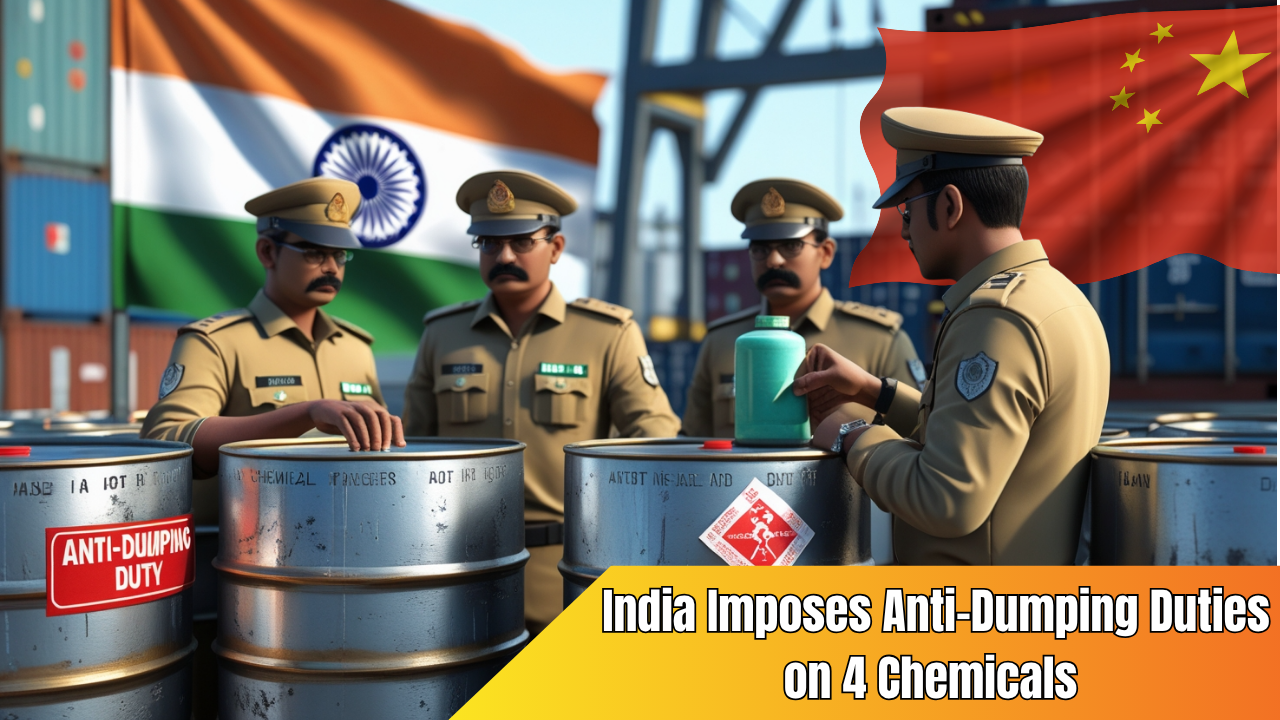
India just sent a clear message to chemical importers: play fair or pay up.
In June 2025, the government imposed anti-dumping duties on four chemicals—most of them sourced from China. The goal? Level the playing field and protect domestic manufacturers from artificially cheap imports.
This isn’t just a policy tweak—it’s part of a larger shift. India’s trade deficit with China just hit $99.2 billion, and the pressure to cut dependence on imports is rising fast.
For chemical buyers and sourcing teams, this is a signal to adapt—fast. Regulatory winds are shifting, and reacting late means higher costs or supply gaps.
This isn’t about obscure compounds. The four chemicals now under duty are cornerstones of major industries—and every one of them matters.
These aren’t optional inputs—they’re irreplaceable. Which means one thing for sourcing teams: the cost curve is bending, and it’s time to adjust.
Here’s how the anti-dumping duties break down across chemicals and countries:
|
Chemical |
Duty Imposed |
Affected Countries |
|
PEDA |
$1,305.6 – $2,017.9 per tonne |
China |
|
Acetonitrile |
Up to $481 per tonne |
Russia, China and Taiwan |
|
Vitamin A Palmitate |
Up to $20.87 per kg |
China, EU, Switzerland |
|
Insoluble Sulphur |
Up to $358 per tonne |
China and Japan |
These rates were not arbitrary. After a full-scale investigation by the DGTR, they were recommended based on clear evidence of undercutting and market disruption.
Each duty will be in force for five years, giving Indian manufacturers breathing room—and forcing importers to rethink their sourcing math.
This isn’t just about penalties. It’s about priorities shifting, and fast. Anti-dumping duties will drive up import costs. Margins will get tighter. Buyers will feel the pinch first.
Procurement teams won’t have the luxury of waiting. Sourcing strategies must adapt, especially for high-volume or price-sensitive inputs. For some, that means exploring Indian suppliers. For others, it means hunting for non-traditional sources in overlooked regions.
Domestic manufacturers now gain an edge. Their pricing power just got stronger—and that changes the entire market dynamic. But here’s the challenge: finding reliable suppliers quickly, without risking compliance, quality, or delivery timelines.
That’s where pharma database providers gives you an edge. With a good pharma database provider like Chemxpert Database, you can:
In a market that’s moving fast, access to smart data beats guesswork every time.
Numbers don’t lie—and this year’s trade data tells a story of growing imbalance.
India’s exports to China dropped by 14.5% in FY 2024–25. Meanwhile, imports surged 11.5%, widening the trade deficit to a staggering $99.2 billion. That kind of gap doesn’t just affect policy, it reshapes it.
The anti-dumping duties are part of a larger economic play. The goal? Reduce import reliance and bring manufacturing back home. This aligns with the Atmanirbhar Bharat mission—India’s push for self-reliance through local production and stronger supply chain control.
Expect more moves like this. The shift is structural, not seasonal. And for manufacturers and procurement leaders, that means one thing: adapt your sourcing before the next policy hits.
These anti-dumping duties aren’t just trade corrections, they’re signals of a larger shift in India’s import strategy.
The rules of sourcing are being rewritten. Price advantages are fading. Compliance risks are rising. And speed matters more than ever.
For chemical buyers, staying reactive isn’t enough. You need to track regulatory changes, forecast pricing pressure, and pivot suppliers, before disruption hits.
That’s where Chemxpert Database comes in.
It’s not just a database—it’s a decision engine. One that gives you visibility into global prices, compliance flags, and verified manufacturers across 200+ countries.

Sick and tired of always wondering if you are being asked to pay the right price for your APIs? This empowers you with the answers you need to make the right decisions in the Global API market.
Chemxpert Database is one of the biggest and most comprehensive directories of pharma and chemicals, manufacturers, suppliers and information. Provided with current information on prices, demand and transactions, it gives you instant feedback on whether you are buying what is right and at the right time.
Start using market intelligence today and allow yourself to be in control in the API market.
Check it out today and make more informed sourcing decisions! Learn More!